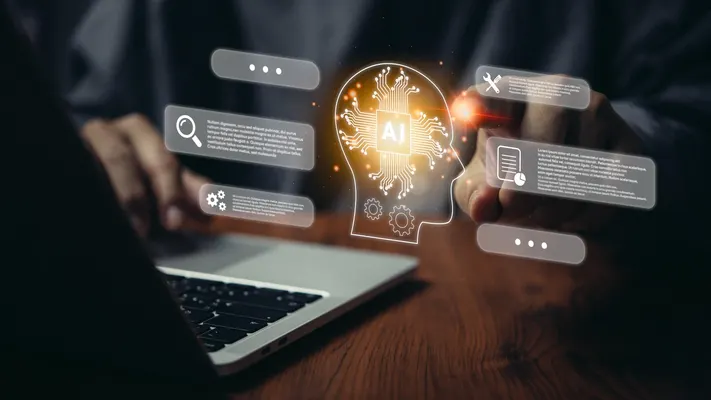
In today’s rapidly evolving business landscape, small businesses often face unique challenges: limited resources, tight budgets, and the constant need to stay competitive. Fortunately, technology is offering a powerful solution—Artificial Intelligence (AI). AI is no longer just a tool for large enterprises with vast budgets; it has become accessible to small businesses, providing them with a range of opportunities to streamline operations, improve customer experiences, and drive growth. Here's how small businesses can harness the power of AI.

1. Automating Routine Tasks
For many small business owners, time is the most precious resource. AI can take over time-consuming tasks such as managing emails, scheduling appointments, or processing orders. Tools like chatbots, for example, can handle customer inquiries 24/7, allowing business owners to focus on more strategic activities. This not only saves time but also ensures customers get quick and efficient responses.
2. Enhancing Customer Experience
AI-driven tools can help small businesses offer personalized experiences to customers. With machine learning, businesses can analyze customer behavior and preferences, allowing them to send personalized recommendations, targeted promotions, or relevant content. By using AI to understand their customers better, small businesses can build stronger relationships, foster loyalty, and increase customer satisfaction.
3. Optimizing Marketing Campaigns
Marketing is critical to growing any small business, but it can be expensive and challenging to measure success. AI-powered tools can analyze large sets of data to provide insights into customer demographics, preferences, and purchasing behaviors. With this information, businesses can create highly targeted and cost-effective marketing campaigns, improving return on investment (ROI) and reducing wasted spend.
For example, AI platforms like Google Ads and Facebook Ads use machine learning to automatically optimize ad placements and bids, ensuring the best possible performance for your budget.
4. Inventory Management and Demand Forecasting
Inventory management is a key concern for small businesses, especially those in retail. AI can help optimize stock levels by predicting future demand based on historical data, seasonality, and market trends. This reduces the risk of overstocking or stockouts, which can lead to lost sales or excess inventory costs. By using AI for demand forecasting, businesses can ensure they have the right products in the right quantities at the right time.
5. Improving Financial Management
AI can also assist small businesses in managing their finances more effectively. Tools like AI-driven accounting software can automate processes such as expense tracking, invoicing, and even tax calculations. These tools can also analyze cash flow patterns, identify areas for cost savings, and provide financial forecasts, helping business owners make smarter, data-driven decisions.
6. Streamlining Hiring and HR Processes
AI can make the hiring process more efficient by scanning resumes and applications, identifying top candidates, and even conducting initial screening interviews through chatbots. This helps small businesses save time and effort during recruitment, ensuring they find the right talent without getting overwhelmed. AI can also assist with employee performance reviews, providing insights into areas for development and growth.
7. Scaling Operations without Increasing Overhead
For many small businesses, scaling up is a major hurdle. Hiring additional staff or expanding operations can be costly and resource-intensive. However, AI enables businesses to scale without significantly increasing overhead. By automating key processes, improving efficiency, and making data-driven decisions, AI helps small businesses grow while maintaining lean operations.
8. Data-Driven Decision Making
AI empowers small business owners to make better decisions by providing them with real-time insights based on data. Whether it’s customer feedback, sales trends, or inventory levels, AI can analyze vast amounts of data quickly and accurately. This allows business owners to make informed, data-driven decisions rather than relying on gut feeling or guesswork.
How Small Businesses Can Get Started with AI
The idea of integrating AI might seem overwhelming, but it doesn’t have to be. Here are a few simple steps small businesses can take to get started:
- Identify Pain Points: Start by identifying the areas of your business that could benefit most from AI, such as customer service, marketing, or operations.
- Choose the Right Tools: There are many AI-powered tools available, from chatbots to accounting software. Research which tools fit your business needs and budget.
- Start Small: You don’t need to implement AI across your entire business at once. Start with one or two tools and gradually expand as you see the benefits.
- Monitor and Optimize: Once you’ve implemented AI solutions, monitor their performance regularly and make adjustments as needed to ensure they continue to meet your goals.
Conclusion
AI is not just a buzzword—it’s a game-changer for small businesses. By leveraging AI technology, small business owners can automate routine tasks, enhance customer experiences, optimize marketing efforts, and make smarter decisions. The best part? AI is now accessible to businesses of all sizes, helping them stay competitive and scale without the need for massive investments. Embracing AI might just be the key to unlocking the future of your small business.
Ready to transform your business with AI? Start exploring the possibilities today!







